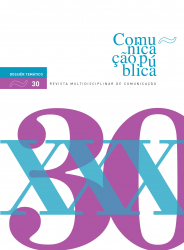The Living Lab on Media Content and Platforms
Results from six months of web browser tracking
DOI:
https://doi.org/10.4000/cp.12665Abstract
The Living Lab on Media Content and Platforms (LLMCP) has developed the LLMCP LisPan project, with the objective of studying the habits and behaviors of Internet users, through an innovative online panel of users using web tracking technology. It was possible to analyze overt online behavior for a sample panel of 70 college students, for six months, and to compare this analysis with their answers to a survey, which additionally was carried out. Results confirm extensive Internet use, but with differences between Friday, Saturday and Sunday, compared to the rest of the week, and the existence of periods of differing intensity, throughout the day. Differences between an “online” dimension of Internet use (search and use of online content) and a “connected” dimension (online interaction with other users) have also been found. It has also been possible to conclude that three-quarters of the participants over-report the frequency of their Internet access.
Downloads
References
Adar, E., Teevan, J., & Dumais, S. T. (2009). Resonance on the web: Web dynamics and revisitation patterns. In D.R. Olsen & R.B. Arthur (Eds.), CHI '09: Proceedings of the SIGCHI Conference on Human Factors in Computing Systems (pp. 1381-1390), Association for Computing Machinery. https://doi.org/10.1145/1518701.1518909.
DOI : 10.1145/1518701.1518909
Banaji, S., Livingstone, S., Nandi, A., & Stoilova, M. (2018). Instrumentalising the digital: adolescents’ engagement with ICTs in low-and middle-income countries. Development in Practice, 28(3), 432-443. https://doi.org/10.1080/09614524.2018.1438366
DOI : 10.1080/09614524.2018.1438366
Blank, G., & Lutz, C. (2017). Representativeness of social media in Great Britain: Investigating Facebook, LinkedIn, Twitter, Pinterest, Google+, and Instagram, American Behavioral Scientist, 61(7) 1–16. https://doi.org/10.1177/0002764217717559
DOI : 10.1177/0002764217717559
Bilenko, M. & White, R. (2008). Mining the search trails of surfing crowds: Identifying relevant websites from user activity. In J. Huai & R. Chen (Eds.), Proceedings of the WWW 2008 - World Wide Web Conference (pp. 51-60). Association for Computing Machinery. https://doi.org/10.1145/1367497.1367505
DOI : 10.1145/1367497.1367505
Castells, M. (2001). The internet galaxy: Reflections on the internet, business, and society. Oxford University Press.
Foddy, W. (1993). Constructing questions for interviews and questionnaires - Theory and practice in social research. Cambridge University Press.
DOI : 10.1016/S0031-9406(10)61110-8
Hargittai, E., & Shaw, A. (2020). Comparing internet experiences and prosociality in Amazon Mechanical Turk and Population-Based Survey Samples. Socius: Sociological Research for a Dynamic World, 6, 1–11. https://doi.org/10.1177/2378023119889834
DOI : 10.1177/2378023119889834
Hunsaker, A., Hargittai, E., & Piper, A. M. (2020). Online social connectedness and anxiety among older adults, International Journal of Communication, 14, 697–725. https://doi.org/10.5167/uzh-186376
DOI : 10.5167/uzh-186376
Kumar, R., & Tomkins. A. (2010). A characterization of online browsing behavior. In ;- Rappa, P. Jones, J. Freire, & S. Chakrabarti (Eds.), Proceedings of the WWW 2010 - World Wide Web Conference (pp. 561-570). Association for Computing Machinery. https://doi.org/10.1145/1772690.1772748
DOI : 10.1145/1772690.1772748
LaPiere, R.T. (1934). Attitudes vs. actions, Social Forces, 13(29), 230-237.
DOI : 10.2307/2570339
Latzer, M., Büchi, M., & Festic, N. (2020). Internet use in Switzerland 2011–2019: Trends, attitudes and effects, Summary Report from the World Internet Project – Switzerland. University of Zurich. http://mediachange.ch/research/wip-ch-2019
Louro, C., Carvalhosa, D., Leonardo, J., Sousa, R., Ferreira, P.C., & Souza, S.B. (2020). Automutilação digital: um estudo exploratório com universitários portugueses, Revista Ambiente Educação, 13(1), 15-30. https://doi.org/10.26843/ae19828632v13n12020p15a30
DOI : 10.26843/ae19828632v13n12020p15a30
Montargil, F., Di Fátima, B., Rodrigues, V., & Santos, V. (2019). Medir a sociedade de informação: Sistema para um painel online de utilizadores da Internet. CISTI (Ed.), 14th Iberian Conference on Information Systems and Technologies (pp-1-4). AISTI. DOI: 10.23919/CISTI.2019.8760838
DOI : 10.23919/CISTI.2019.8760838
Montargil, F., Di Fátima, B., & Ruiz, C. (2020). Building a web tracking browser information system: The online panel as a research method in internet studies. In A. Rocha, C. Ferrás, C. Montenegro Marin, & V. Medina García (eds) (Eds), Information Technology and Systems. ICITS 2020. Advances in Intelligent Systems and Computing, vol 1137 (pp. 449-455). Springer. DOI: https://doi.org/10.1007/978-3-030-40690-5_44.
DOI : 10.1007/978-3-030-40690-5_44
Murdock, K. K. (2013). Texting while stressed: Implications for students’ burnout, sleep, and well-being, Psychology of Popular Media Culture, 2(4), 207–221. https://doi.org/10.1037/ppm0000012
DOI : 10.1037/ppm0000012
Pew Research Center (2018). Social media use in 2018. https://www.pewresearch.org/internet/2018/03/01/social-media-use-in-2018/#:~:text=A%20new%20Pew%20Research%20Center,trends%20and%20newly%20emerging%20narratives.&text=Similarly%2C%2071%25%20of%20Americans%20in,45%25)%20are%20Twitter%20users
Reich, S., & Vorderer, P. (2013). Individual differences in need to belong in users of social networking sites. In P. Moy (Ed.), Communication and community (pp. 129-148). Hampton Press.
Reinecke, L., Klimmt, C., Meier, A., Reich, S., Hefner, D., Knop-Huelss, K., … Vorderer, P. (2018). Permanently online and permanently connected: Development and validation of the Online Vigilance Scale. PLoS ONE 13(10), e0205384. https://doi.org/10.1371/journal.pone.0205384
DOI : 10.1371/journal.pone.0205384
Revilla, M., Ochoa, C., & Loewe, G. (2016). Using passive data from a meter to complement survey data in order to study online behavior. Social Science Computer Review, 35(4), 521–536. https://doi.org/10.1177/0894439316638457
DOI : 10.1177/0894439316638457
Smahel, D., Machackova, H., Mascheroni, G., Dedkova, L., Staksrud, E., Ólafsson, K., …Hasebrink, U. (2020). EU Kids online 2020: Survey results from 19 countries. London School of Economics and Political Science.
Statcounter (2018). Top desktop, tablet & console browsers per country. Global Stats Tool.
Trindade, G., & Duarte, A. (2019). Comparing the consumption of musical and films online between generations X and Y in Portugal and Spain. 2019 14th Iberian Conference on Information Systems and Technologies (CISTI), Coimbra, Portugal, pp. 1-6.
Vorderer, P., Krõmer, N., & Schneider, F. M. (2016). Permanently online and permanently connected: Explorations into university students’ use of social media and mobile smart devices. Computers in Human Behavior 63, 694-703. http://dx.doi.org/10.1016/j.chb.2016.05.085.
DOI : 10.1016/j.chb.2016.05.085
Vorderer, P., Hefner, D., Reinecke, L., & Klimmt, C. (Eds.). (2018). Permanently online, permanently connected. Living and communicating in a POPC world. Routledge.
Downloads
Published
Issue
Section
License
Copyright (c) 2021 Direitos do Autor (c) 2021

This work is licensed under a Creative Commons Attribution-NonCommercial 4.0 International License.
Os conteúdos da Comunicação Pública estão licenciados com uma licença Creative Commons - Atribuição-NãoComercial 4.0 Internacional.


